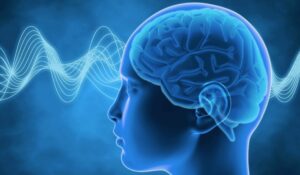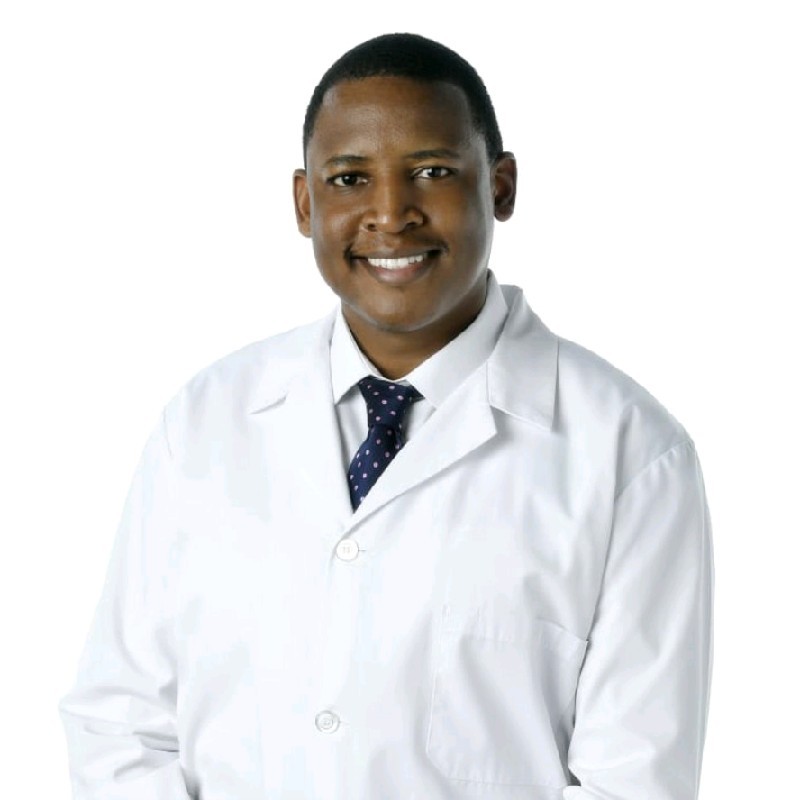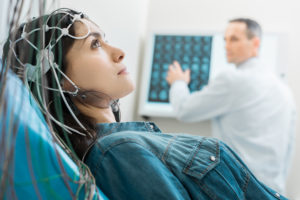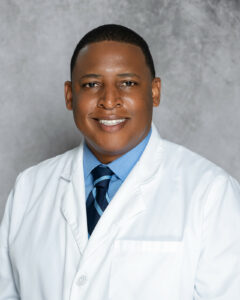This Breakthrough Treatment is Non-invasive, Drug-free, and Can Provide New Hope for Stroke Recovery.

How MeRTsm Works

- Transcranial Magnetic Stimulation(TMS, an FDA cleared therapy),
- Quantitative Electroencephalogram (qEEG), and
- Electrocardiogram (ECG/EKG).
The EEG is key to the success of the MeRT treatment. Stroke patients have markers that are clearly visible in their EEG studies. The EEG can show us an imbalance in brainwave activity. Then, through a highly personalized treatment plan, we strengthen healthy brainwave activity. This treatment can result in a significant reduction of symptoms.
Call us: 407-730-4240
Or fill in the form below and she will contact you.
Types of Stroke
There are five main types of stroke, each with specific causes and effects:
- Ischemic Stroke is the most common type of stroke. It occurs when a blood clot obstructs a blood vessel to the brain and occurs in 87% of patients.
- Hemorrhagic Stroke happens when weakened blood vessels within the brain rupture and bleed into the surrounding tissues. The most common cause of hemorrhagic stroke is uncontrolled high blood pressure.
- TIA (Transient Ischemic Stroke) is also called a “mini-stroke” and is caused by a temporary clot in the brain. TIA symptoms are mild; they should be taken seriously, however, because they are a warning sign for a much more serious stroke.
- Cryptogenic Stroke is a stroke from an undetermined cause. It can be quite debilitating.
- Brain Stem Stroke occurs in the stem of the brain instead of the brain itself. When a stroke occurs in the brain stem, it can affect both sides of the body and may leave someone in a ‘locked-in’ state, generally unable to speak or move below the neck.
After-effects of Stroke

Dedicated to Improving Your Quality of Life Post-Stroke

Our Medical Director and Founder, Gilbert Mbeo, MD, is a triple board-certified physician specializing in Neurology, NeuroIntensive Care, and Interventional Pain Management. Moreover, Dr. Mbeo has spent more than 13 years providing evidence-based, high-quality care to patients with acute neurological needs, including acute stroke. As a result of his years of experience, Dr. Mbeo has seen the life-altering consequences of brain injuries from strokes, and as such is dedicated to helping patients recover. To that end, he established our state-of-the-art facility where treatments like MeRT can be delivered.
How to Find Out More About MeRT for Stroke Recovery
MeRT is a relatively new treatment, so you may have many questions as to whether it’s the right treatment for you. We understand, and we’re here to make it as easy as possible for you to get the information you need. We also know that this is not a light decision to make. Your first step is as simple as a phone consultation with our New Patient Coordinator. During this consultation, you can discuss symptoms and history, ask all the questions you want, and have her explain the treatment in full. She will also discuss all fees and protocols at that time.
Post-Stroke Treatment: What to Expect
Once you decide to take the next step, we then set up two separate appointments. Each of these appointments will last 45 minutes to an hour. After this, we have an assessment period where the actual procedure and monitoring take place.
EEG Testing
On your first appointment, we perform the qEEG and ECG/EKG. These tests are simple and painless and done right in our office. For the EEG, we place a cap on your head to measure the electrical activity in your brain. This will map out any areas which are not performing as they should. Additionally, in the EKG, we attach an electrode to your chest to record your heart’s electrical signals. Once we perform the tests, our scientific team and Dr. Mbeo will carefully analyze the results. Based on this analysis, we develop a treatment plan customized to your specific condition and schedule your assessment period of treatment.
Consultation
Your second appointment, after your qEEG/EKG, is a one-on-one consultation. You can do this either in person or virtually from the comfort of your home. We will discuss your test results and treatment protocols, answer any questions you may have, and let you know more about what to expect during your assessment period.
Assessment Period
In this step, we will perform a short period of treatment, followed by a new EEG to see how you’re responding to the treatment. We determine progress based on the new EEG results compared to the initial one done, and we look at symptom improvements. If there is a positive response to treatment during the assessment period, you will have likely noticed some improvements starting to take place.
At that point, we will schedule additional MeRT treatment in two-week intervals. It generally takes at least six weeks to see lasting improvement. At the end of every two weeks, we will perform a qEEG/EKG to monitor your progress; you will have a consultation to confirm that changes are still showing on the testing. Most conditions treated with MeRT, including post-stroke treatment, provide noticeable and long-lasting results after six to eight weeks of treatment; however, each patient is different, and results may vary.
 Founder and Medical Director
Founder and Medical Director
Gilbert Mbeo, MD is a triple board-certified physician who specializes in Neurology, NeuroIntensive Care, and Interventional Pain Management, with over 13 years of experience providing evidence-based, high-quality care to patients with acute neurological needs including acute stroke, neuromuscular respiratory failure, status epilepticus, and brain and spinal cord trauma.
Dr. Mbeo is a Neurointensivist, meaning that not only does he have an in-depth understanding of neurology and neurological conditions, but his expertise is in the care of critically ill neurologic patients with acute brain, spine, and neuromuscular disorders. This specialty is also referred to as neurologic intensive care, critical care neurology, and neurocritical care. After learning about the brain healing effects of neuromodulation Dr. Mbeo established the Brain Treatment Center Orlando in order to use interventions like cognitive rehabilitation, Magnetic Resonance Therapy (MeRT), and transcranial magnetic stimulation as non-invasive treatment options for an array of neurological conditions.
Contact Our New Patient Coordinator for More Information
Our New Patient Coordinator is available to answer any questions that you may have about how MeRT can help you. When you speak with her, she’ll take the time to listen to your concerns, answer your questions, explain costs, and put your mind at ease. She can also assist you in getting scheduled should you decide to move forward with treatment. We understand what you may be going through, and our goal is to help guide you through the process with quality care in a warm and compassionate environment. Many MeRT clinicians and technicians have gone through treatment themselves. As a result, they know first-hand what this treatment can do. That’s why they’re passionate about helping you to heal.
Call Us Today. We are Here to Help.
Our New Patient Coordinator will take the time to answer your questions, listen to your concerns, and explain our procedures.
Call us: 407-730-4240
Or fill in the form below and she will contact you.
Contact Us
For more information or to speak with our New Patient Coordinator, please fill in the information below.


 Founder and Medical Director
Founder and Medical Director